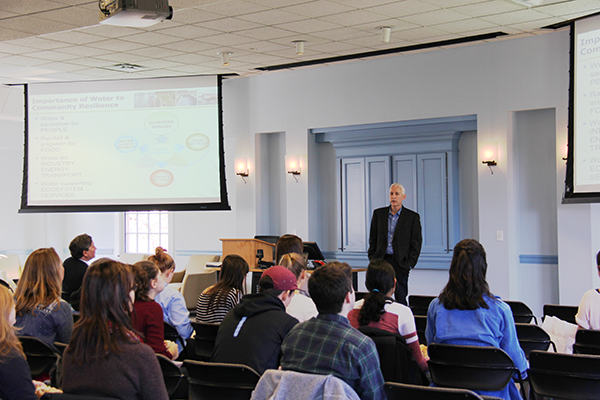‘Triple bottom line: economy, quality of life, and the environment, will make communities more resilient,’ says Clements
March 10, 2017
UNC’s Institute for the Environment hosted Trevor Clements, president of Tetra Tech Engineering, P.C., for its Jan. 24 Clean Tech Luncheon. Clements discussed the history of the water system in the U.S. and what his company is doing to implement innovative water management solutions. Tetra Tech Engineering, P.C., is a consulting, engineering, program management, construction management and technical services company for government and commercial clients.
“The way we manage water is outdated,” Clements said. “It was created for a different time, and a different approach.
The water system in the United States went through several phases, depending on the changing needs of the people, he explained. First, it needed to be treated for bacteria. Later on, after the Industrial Revolution led to massive water pollution, the Clean Water Act of 1972 was created and Congress began signing laws and creating programs to oversee the maintenance and protection of water systems.
Yet, even with hundreds of programs overseeing the country’s water systems, Clements said up to 45 percent of water doesn’t meet clean standards. The problem, according to Clements, is an outdated system not built for modern times and a network too divided among different organizations.
“The current paradigm is not capable of addressing those challenges. So what’s happened is that many of us have seen this and we’re working to fix it,” he said.
To mend the issue, Clements said the country must begin to think in multifunctional terms. For instance, instead of creating a storm water device that deals strictly with filtering water, engineers should be building systems that not only filter water, but also provide other benefits such as coolants for energy sources.
Thinking in a bigger picture, Clements said, is key. In order to build a better water system that also provides better water benefits, costs less, and benefits the community means integrating technologies at a watershed scale. Essentially, expanding the scope that engineers and developers look at.
But, this requires the expertise of an array of specialties to come up with a better system. Clements calls it the “triple bottom line:” economy, quality of life, and the environment. Having all of these in mind will move the country forward towards more sustainable practices. Planning around natural systems and supporting local economies in the process will help make communities more resilient and will be more effective in the long-term.
“To do this, you need leadership at the top and folks that are invested in the capacity to do this- investing in transforming that administrative capacity as well as in incentives, policies, and procedures,” he said.
After working on Raleigh’s water system over the last few years, Clements said it was the perfect case study. For years, Raleigh attempted to put into effect a plan to become a greener community and improve the city’s water quality. Eventually, they enlisted the help of Clements and his team, who quickly amassed a task force of anyone and everyone involved with water, waste, and the environment.
“We needed to understand where the city was currently and how to build the capacity to implement the system,” he said.
Building the capacity for a cleaner water system meant creating new laws, getting together a trained staff, working with utilities, and creating a planning department. While they faced numerous impediments each week, they eventually, with the help and expertise of everyone involved, drafted a fact sheet on how to implement the new system and it’s cost. Now, Raleigh is looking at implementing this new, environmentally conscientious and sustainable system.
With this new system, Raleigh will be a frontrunner in achieving a better quality of life for its residents, benefit it’s economy, and meet its environmental objects.
Clements obtained a master’s in Water Resources from Duke University and now works with local, state, and federal agencies and organizations to incorporate more sustainable water practices that take into account not only water management and protection, but also how water relates to energy, development, and climate.
